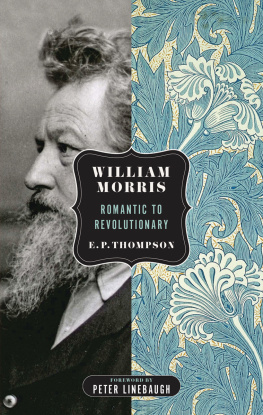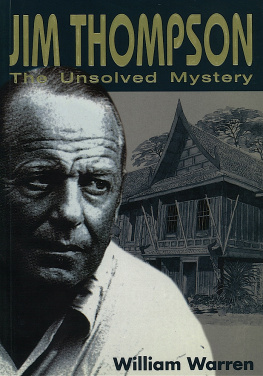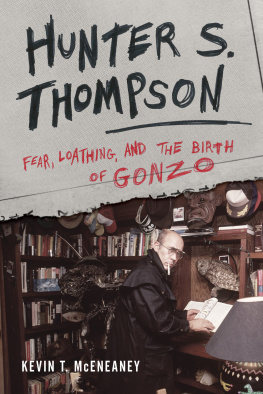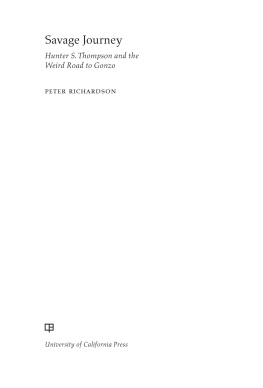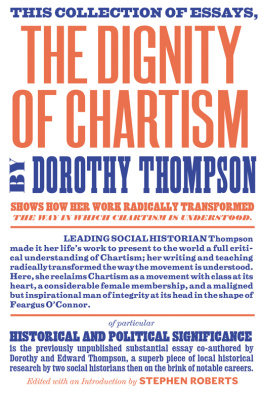E. P. Thompson and the Making
of the New Left
E. P. Thompson
and the Making of the New Left
Essays & Polemics
Edited by CAL WINSLOW

Copyright 2014 by the estate of E. P. Thompson
Introduction copyright 2014 by Cal Winslow
All Rights Reserved
Library of Congress Cataloging-in-Publication Data
available from the publisher
978-1-58367-443-7 pbk
978-1-58367-444-4 cloth
Monthly Review Press
146 West 29th Street, Suite 6W
New York, New York 10001
www.monthlyreview.org
UK ISBN: 978-1-909831-07-0 (paperback)
PUBLISHED IN THE UK BY:
Lawrence & Wishart
99a Wallis Road
London E9 5LN
www.lwbooks.co.u
Typeset in Arno Pro
5 4 3 2 1
Contents
Acknowledgments
First, I thank Faith Simon for her collaboration in every stage of this project. This is found not in this or that particular but in the entire project, start to finish.
I want also to thank David Howell, Joseph Matthews, and Iain Boal for their support and encouragement, above all for generously reading, commenting on, and correcting drafts. I thank them too for their many years of friendship.
I thank Michael Watts and the Geography Department at the University of California, Berkeley, for support.
Acknowledgment is due to the staffs at the Brotherton Library, the University of Leeds, the Hull History Centre, the Modern Records Collection, Warwick University, the Stanford University Libraries, and the University Library at the University of California, Berkeley.
I must thank Rosalie Winslow and also the staff at the University of Edinburgh for helping to find and retrieve a copy of Through the Smoke of Budapest.
I am indebted to Andrew Gordon, Sven Beckert, and Jessica Barnard for the kind invitation to address the the Global E. P. Thompson Conference held at the Weatherhead Center, Harvard University, October 35, 2013. It inspired me to think harder, and introduced me again to Edwards international world.
I would like to thank Fred Inglis, Trevor Griffiths, Hilary Rose, Michael Barrett-Brown, and Marion Kozak, all of whom knew Edward back in the day, for taking time to speak with me and offering invaluable recollections and reflections on the issues and events that are the subject here.
I have had the invaluable assistance of friends and former students of Edwards: Judith Condon, Julian Harber, Paul Smith, Anna Davin, and Hugo Radice. I thank them for support, for their hospitality, for helping me to try to make Edward come alive once more, and for the opportunity to reflect on our own experiences with history from below, our work in adult working-class education, and with (the struggle continues!) the future of socialism! All of us, in one way or another, have been inspired by Edward.
Richard Taylor, Roger Fieldhouse, and David Goodway all generously shared their histories of the Extramural Department at Leeds University, including drafts of chapters, then unpublished, from E. P. Thompson and English Radicalism.
I have also benefited greatly from the encouragement of Marcus Rediker and Eric Hoddersen, as well as the advice and criticism of Laurie Flynn, Madeline Davis, Sheila Rowbotham, Kate Soper, John Grayson, Joseph White, Gillian Boal, John Gillis, Stephen Roberts, Pete Clarney, and Michael Rustin, as well as support from Will Smith, Jean Corston, and Summer Brenner.
Tim Clark and Anne Wagner opened their home and library to me, and also reopened for me the world of L. S. Lowry, while giving me in London a home and office away from home at a time when this was sorely needed.
Kate Thompson and the late Dorothy Thompson encouraged and supported me in the earliest stages. I regret that Dorothy, who always insisted that people read Edward, will not see the outcome of this project.
Of course, Michael Yates, Martin Paddio, and the staff at Monthly Review Press are to be thanked, above all for their patience, collaboration, and dedication to work in publishing, a vocation Edward knew well and documented in the many histories he produced.
The Introduction that follows I offer as my thanks and tribute to Edward Thompson. It has been a great pleasure for me to write which is, all at once, stirring, difficult, emotional, inspiring again. It has allowed me a chance, in a small way, to repay a great debt, too late of course, but such is the nature of things. I hope the errors will be few; they will in the event be my responsibility alone.
Finally, I must thank Jessie Winslow, Samantha Winslow, Rosie Winslow, and Matthew Winslowand again, Faithfor the love without which work and life could have little meaning.

IT IS NEVER SAFE TO ASSUME THAT ANY
of our history is altogether dead. It is more often lying there, as a form of stored cultural energy. The instant daily energy of the contingent dazzles us with its brightness. What passes on the daily screen is so distracting, the presence of the status quo is so palpable, that it is difficult to believe that any other form of energy exists. But this instant energy must be reproduced every moment as it is consumed; it can never be held in store. Let the power be cut off for a while, then we become aware of other and older reserves of energy glowing all around us, just as, when the street-lights are dowsed, we become aware of the stars.
A Special Case
Writing by Candlelight
INTRODUCTION
Edward Thompson and the Making of the New Left
If many of the Yorkshire young people had in fact got socialism inside of them, then something of its qualitythe hostility to Grundyism,! the warm espousal of sexual equality, the rich internationalismowed much to Tom Maguire.
The late Edward Thompson paid special tribute to only a few individuals. Tom Maguire was one. Maguire was a young Leeds socialist (18651895); he was a member of the Socialist League and a founder of the Yorkshire Independent Labour Party (ILP). Thompson immortalized him in his 1960 essay Homage to Tom Maguire, reprinted in this book.
Maguire personified the tradition of northern socialism for Thompson and connected him and his own comrades to that tradition. Thompson clearly felt a deep admiration for the young socialist (Maguire died at thirty). It was not that he idealized Maguire, but he did see in him the best of the working class, the kind of person the socialist movement needed. Maguire, semi-employed, of poor Irish-Catholic parentage, became a socialist at sixteen; he joined the Social Democratic Federation (SDF) a year later. When the split in the SDF took place in 1884, he sided with William Morris, artist and revolutionary socialist. This, for Thompson, was not simply an episode of historical interest. Rather, it was a link in a chain; and this took him right back to the origins of British Marxism and its since-forgotten fusion with English Romantic socialism, with Morris, his circle, and the Socialist Federation.
Edward Thompson was one of the great figures of the postSecond World War left.
In the years 1948 to 1965, Edward Thompson lived with his family in Halifax in the north of England. Edward and Dorothy Thompson had been Communist Party members; they joined in the war years, horrified by Hitler but critically ill-informed in regard to the Soviet Union and Stalin. In the crisis of 1956 (Hungary and Suez), they rebelled, left the Party, and became founders of a New Left, a British movement in an international current of dissident Communists. This movement was as well an early manifestation of the youth rebellions of the decade to come.
Next page

